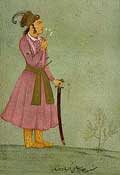Akbar the Great
Incarnations of El Morya
 When Akbar Jalal Ud-din Mohammed inherited the throne in 1556, the sixteenth-century Mogul empire of India had been effectively reduced by fierce conquest until only the capital city, Delhi, remained. Not yet fourteen at his accession, the brilliant young emperor set out to reconquer his realm. He became known throughout the world as Akbar the Great—the most powerful of the Mogul emperors.
When Akbar Jalal Ud-din Mohammed inherited the throne in 1556, the sixteenth-century Mogul empire of India had been effectively reduced by fierce conquest until only the capital city, Delhi, remained. Not yet fourteen at his accession, the brilliant young emperor set out to reconquer his realm. He became known throughout the world as Akbar the Great—the most powerful of the Mogul emperors.
Tremendous physical stamina characterized Akbar and contributed to his extraordinary military success. He could ride 240 miles in twenty four hours to surprise and defeat the enemy. Nevertheless, it took the major part of his long reign (1556 - 1605) to subject the rebellious princes of northern India and to secure peace by establishing sound provincial governments. Akbar was endowed with a genius for administration. He increased trade efficiency by constructing roads, by developing advanced marketing systems, and by instituting postal services.
 The new capital city, Fatehpur Sikri, soon became a flourishing cultural center larger than the city of London at that time. In wise concern for all peoples under his jurisdiction, Akbar abolished the hated jizya, the poll tax levied on non-Muslims, and gave Hindus prominent government positions. At Fatehpur, Akbar assembled Muslim, Hindu, Jain, Zoroastrian and Jesuit scholars. He later built an ibadat khana, a "house of worship," where learned men of all religions could meet to discuss both theology and philosophy. As a result, a new eclectic faith emerged called the Din i Illai (Divine Faith).
The new capital city, Fatehpur Sikri, soon became a flourishing cultural center larger than the city of London at that time. In wise concern for all peoples under his jurisdiction, Akbar abolished the hated jizya, the poll tax levied on non-Muslims, and gave Hindus prominent government positions. At Fatehpur, Akbar assembled Muslim, Hindu, Jain, Zoroastrian and Jesuit scholars. He later built an ibadat khana, a "house of worship," where learned men of all religions could meet to discuss both theology and philosophy. As a result, a new eclectic faith emerged called the Din i Illai (Divine Faith).
Akbar strongly supported Indian art, and under his direction more than one hundred workshops were established for the crafts. The emperor himself was very fond of music and encouraged it as a means of communication between Hindus and Muslims. Although illiterate, Akbar's library of illustrated manuscripts was as celebrated as the finest collections in Europe.
At the end of his reign, the peace and prosperity which Akbar had brought to India was disturbed by the court intrigues and subversive activities of his son, Jahangir. When he inherited the throne, Jahangir rejected his father's reforms, especially those of religious tolerance, and the empire rapidly crumbled. Jahangir's son, Shah Jahan, inherited only a small and unruly kingdom but retained a great love for the cultural heritage of his grandfather. As the greatest of the Mogul builders, Shah Jahan gave to India its most cherished romance: the Taj Mahal.
